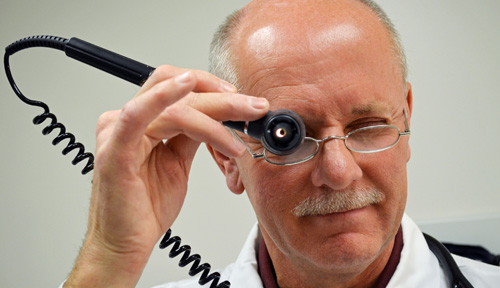“Hey Thom, what does the inside of a normal ear drum look like?”
It wasn’t the set-up to a joke.
Back home in his typical job, Thom Weis’ friend – an army physician assistant — spent his time in a specialty – heart surgery. He knew the heart vessels, veins and ventricles with precision and expertise but was far removed from foundational areas like ear drums, fractures and thyroid issues.
“When my army buddy asked me about ear drums, I just shook my head,” said Weis, a physician assistant. “Primary care experience gives you such variety and keeps you challenged. In specialty care, you really lose a lot of skills, except what you’re good at.”
Weis was 17 when he started his army career in the reserves. He has been deployed three times including Iraq and Germany. As a physician assistant, he once supervised 18 army medics in Iraq and was the first line of care for 1,000 soldiers. He said his expertise in primary care helped his battlefield patients.
“Having the knowledge to treat so many different conditions is critical,” he said.
For 18 years, Weis has treated the gamut of conditions as the only full-time physician assistant for homeless patients at the Charles Drew Health Center in Omaha. He sees 350 to 400 patients per month. Many line up to see him.
“The need is tremendous,” he said.
“From a professional standpoint, it is rewarding to deal with multiple, complex issues but then it is heart-breaking when they have so many problems and you have to dig to find resources to refer them for additional care. And, at times, it’s frustrating because you don’t know what to do in the interim.”
The complexity of the homeless patient population also provides opportunity.
“There’s a lot of autonomy for mid-level providers. You learn leadership skills, grant writing, budgets, decision-making and you have to think outside-the-box to care for patients.”
That includes his idea for a traveling van.
Since many homeless don’t like to go to shelters, Weis could take a medical van to them. Then, the van could travel to the shelters that didn’t have a medical clinic. Patients could get exams, prescription refills and referrals.
“If it wasn’t for the clinic, these patients wouldn’t have much else. Our patients know us and are comfortable with us. And we don’t take offense to how they dress, smell or their mental illness. You can do so much more for underserved patients,” he said.
While his PA-on-wheels program was short-lived, Weis can’t imagine doing anything else. His heart is here, serving the homeless. And so is his reward.
